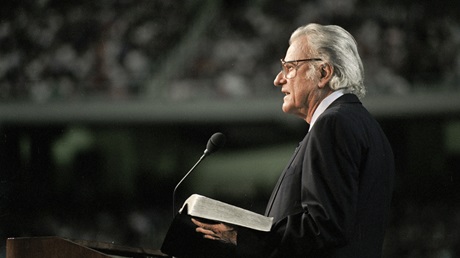The evangelist (and CT founder) is 98 today. An historian examines the way he shaped the church and the world.

The preacher’s long life started on a dairy farm near Charlotte, North Carolina, on November 7, 1918. The Great War in Europe ended on November 11, 1918. He liked to joke that it took the world only four days to hear that he had arrived.
Billy Graham’s 98th birthday, today, seems a good time to pause and think about the impact of his work.
Most evident are the numerical records. Graham probably spoke to more people face-to-face than any other person in history, 215 million at last count. Additional hundreds of millions encountered him via electronic and print media. In 1956, he founded Christianity Today, which soon ranked as the most widely read Christian periodical in the world. Graham organized international conferences in Europe that helped galvanize the global evangelical movement. He nabbed a spot on Gallup’s list of “Most Admired Man in the World” 59 times, nearly twice as as often as runner-up Ronald Reagan.
Graham’s most obvious legacy is the three million men and women who registered commitments for Christ at his crusades. Beyond that figure stand the numberless souls who made decisions in the quiet spaces of their lives.
Yet these data tell only part of the story. Graham’s legacy has taken forms that are hard to measure but important to remember. We see them especially in the realms of evangelical beliefs, everyday life, American politics, and Christian hope.
Beliefs, Changing and Unchanged
Many of Graham’s beliefs stayed exactly the same decade after decade—and if they sound like the heartbeat of evangelicalism, that is partly because he made them so. They included the Bible’s authority, God’s sovereignty, humans’ sin, Christ’s saving death, …


